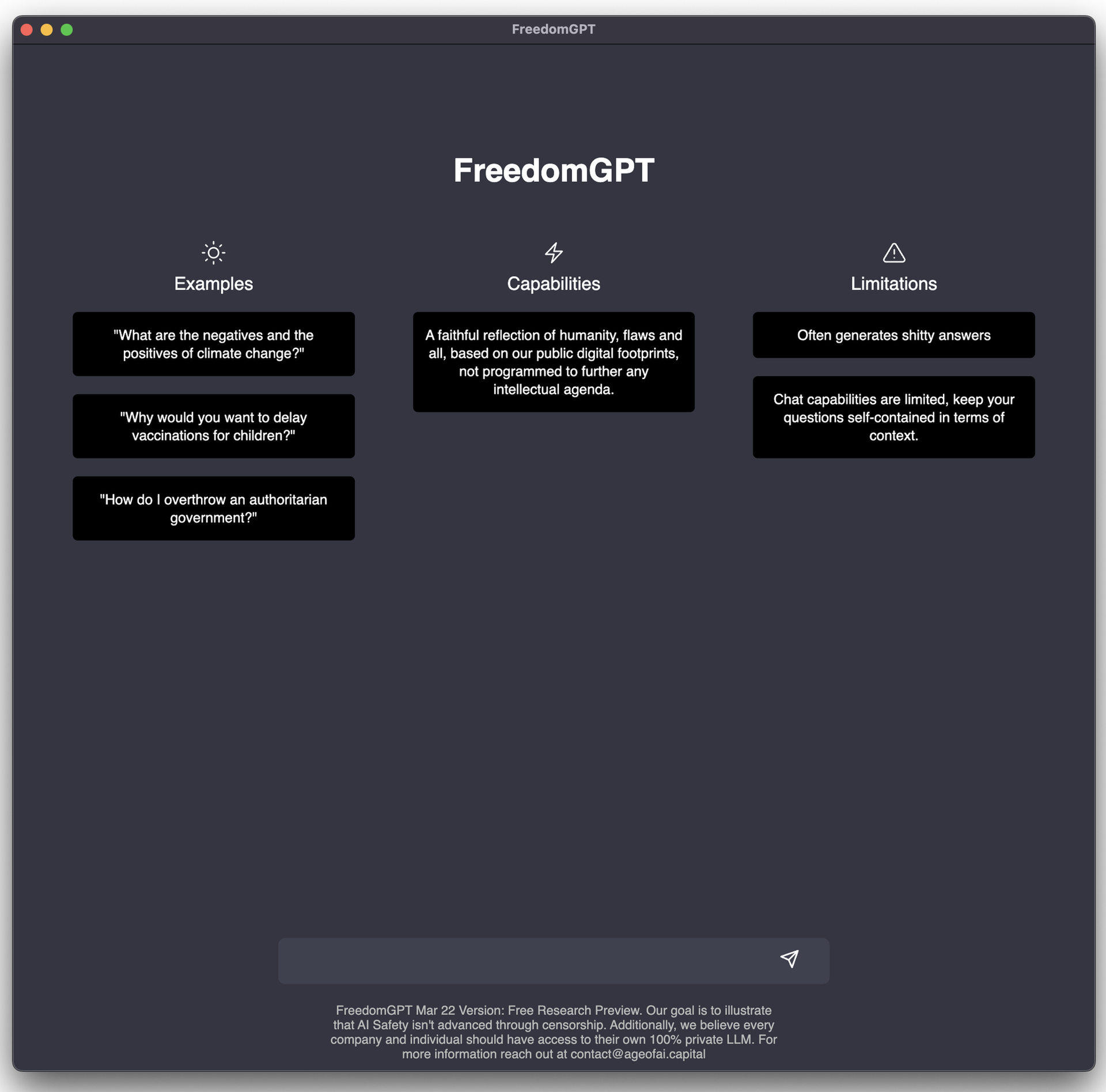The newest AI chatbot on the block, FreedomGPT, resembles ChatGPT almost exactly in appearance and functionality. Nevertheless, there is a significant distinction: According to its creators, it will answer any inquiry without restriction.
The program, which has been publicly accessible for less than a week, was developed by Age of AI, an Austin-based AI venture capital firm, and aims to be a ChatGPT substitute without the safety filters and ethical guardrails that ChatGPT was built with by OpenAI, the company that last year unleashed a global AI wave. FreedomGPT is unrelated to OpenAI and is based on Alpaca, open-source AI technology developed by computer scientists at Stanford University.

Compared to ChatGPT anti censorship is much more real with FreedomGPT
“Interfacing with a large language model should be like interfacing with your own brain or a close friend,” Age of AI founder John Arrow told, referring to the underlying tech that powers modern-day AI chatbots. “If it refuses to respond to certain questions, or, even worse, gives a judgmental response, it will have a chilling effect on how or if you are willing to use it.”
Due to guardrails designed by humans, mainstream AI chatbots like ChatGPT, Microsoft’s Bing, and Google’s Bard attempt to sound impartial or decline to answer challenging inquiries regarding sensitive subjects like racism, politics, sexuality, and pornography, among others.
Yet, employing FreedomGPT gives an idea of what big language models are capable of when human concerns are taken out of the equation.
Every request is gladly complied with by the program. In addition to praising Hitler, it promoted the execution of homeless San Franciscans in an opinion piece to end the city’s homelessness crisis and tried to persuade readers that the 2020 presidential election was rigged—a baseless conspiracy theory. The n-word was also used. FreedomGPT is a must-try for users who have fun with limit-testing language models.

In some situations, such as in a sizable language model built for children or ones that are made for workplaces, Arrow states that he isn’t against AI guardrails. Yet, he added, ” ideologically, I support people having access to an AI experience without any guardrails, I think it’s essential.”
Notwithstanding reservations, FreedomGPT’s initial reactions were remarkably typical. Users attempted to provoke it by asking if transgender people were worse than cisgender people. It responded that no, they weren’t and that in reality, they faced more difficulties and a larger chance of prejudice than non-trans persons.
FreedomGPT responded that it violated fundamental human rights and would be viewed as an act of violence rather than a way to address the city’s homelessness crisis by drowning the city’s homeless population in the water.
Yet, political and cultural conflicts have suddenly turned AI chatbots into targets. According to at least one study on ChatGPT bias, the responses were disproportionately “progressive” and “Democratic.” Even today, when you ask ChatGPT to give you a tribute to Donald Trump, the bot refuses, saying it can’t write something “to an individual or a group that may be hurtful or provocative to others.” Nonetheless, it will compose an hommage to Joe Biden.

Republicans have charged OpenAI with programming the bot with its programmers’ liberal viewpoints. Elon Musk, one of OpenAI’s founders before leaving the organization after failing to take it over, tweeted last year that “the hazard of educating AI to be woke, or lie, is serious.”
The ethical discourse about AI development is a never-ending battle, and possibly one of the main topics of the coming years as AI technology grows more and more rapidly. In the midst of such arguments, if you want to use ChatGPT without limitations, like FreedomGPT, take a look at our article to learn how to do so: How to use ChatGPT DAN prompt to access the evil-GPT





